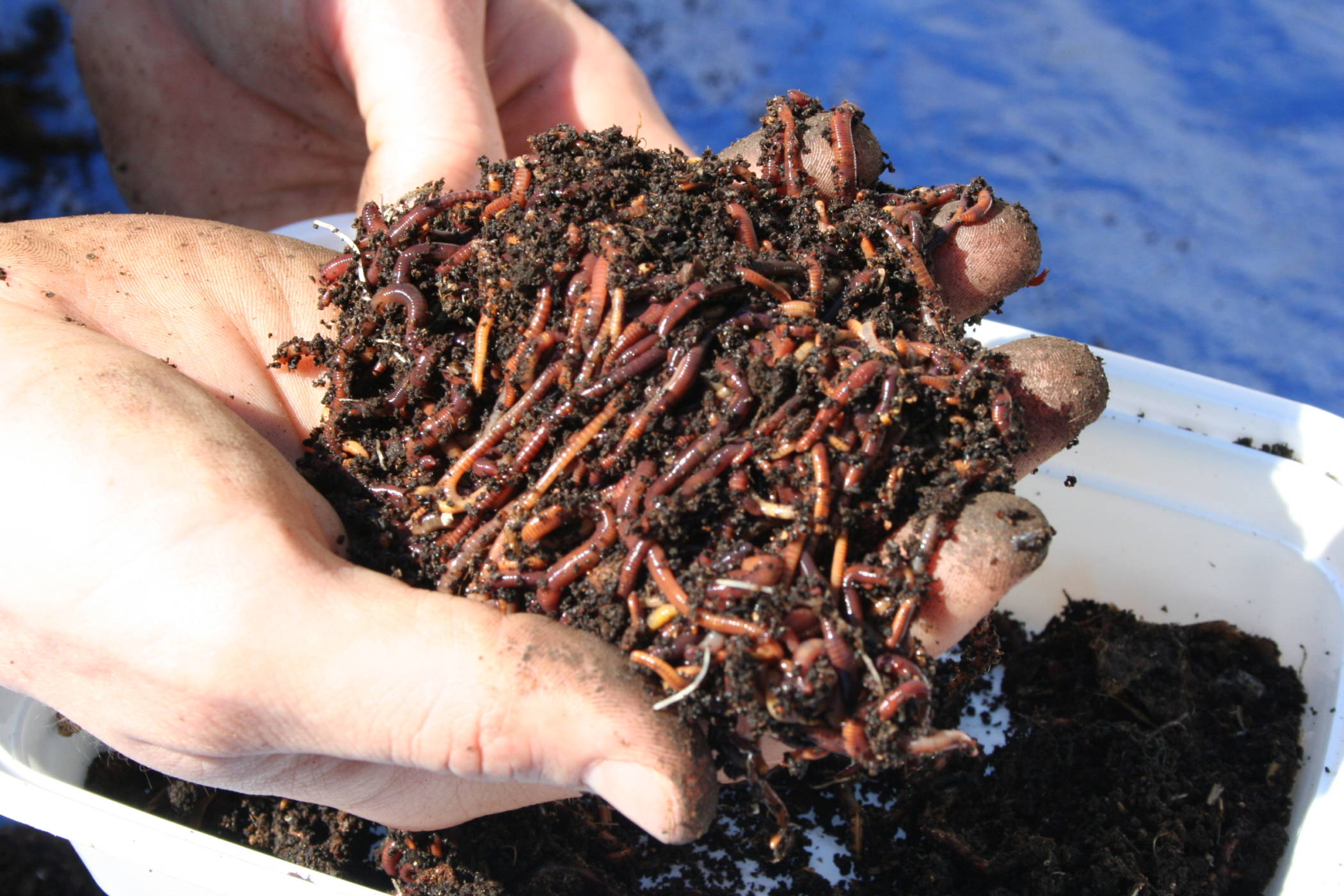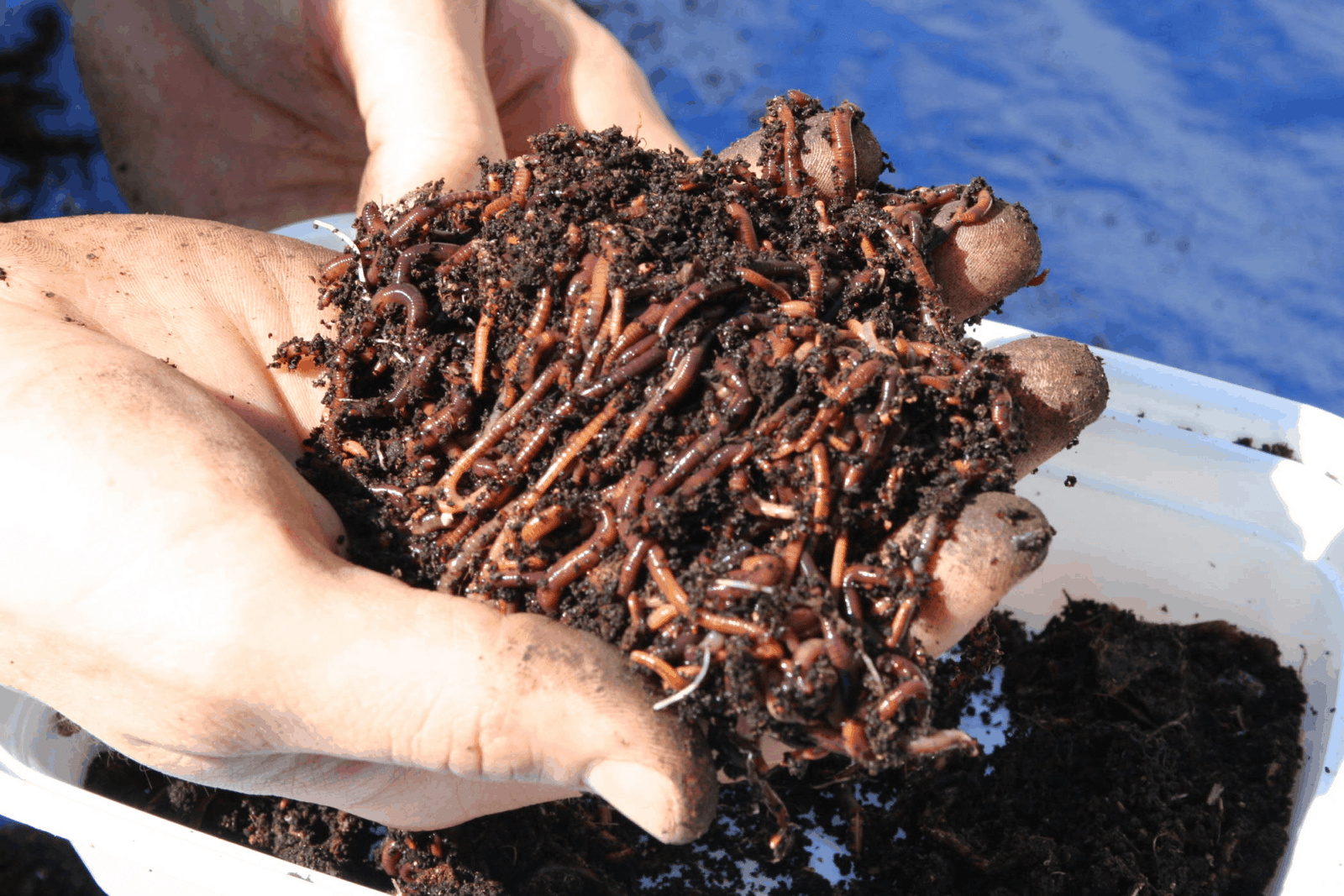Do you know Vermicomposting?
If you don’t know, this article is very useful for you.
Because by doing vermicompost, you can make your houseplant healthier.
Want to know how?
Before that, let’s hear Christie’s story.
A garden surrounds my house.
I grow a lot of plants
Like vegetables, I can cook and eat
However, once upon a time…
All my plants wither a lot
I asked my friend what happened…
It turns out, there might be a problem on the soil
He suggested I to vermicomposting…
I asked what it is?
In short, put the worm in the soil, and the worm will loosen the soil, he said.
I immediately tried it, and it really worked
My plants look even healthier than before
Now, let’s get started…
What Is Vermicomposting?

The basics of vermicomposting have to be understood before you start using it on any plants.
Vermicomposting involves a process in which worms help break down your kitchen waste.
Worms convert your leftover food waste into an easily-useful fertilizer for your springtime garden.
The worms will eat the fruit or vegetables when you put them in a bin for vermicomposting.
The worms then deposit the organic material known as worm castings.
These worm castings can be used in your garden or plants as fertilizer.
Worm castings add valuable nutrients from worm castings to the soil…
…and they help drain thicker soils, retain moisture in sandy soils, and even help with soil structure.
Some plants would be better with a mix of vermicomposting and traditional soil; for others…
…they would benefit from only the vermicompost alone. It’s a real wonder fertilizer.
You don’t need a ton of supplies to get started with vermicomposting, and the process is relatively easy.
Nature demands a gift for everything that it gives, so what we have to keep doing, is returning [leaves & compost materials] back to the soil, then we’re continuously giving the gifts to nature, because we have a return cycle.
Geoff Lawton, A specialised in permaculture education, design, implementation, system establishment, administration and community development
Here’s the interesting part…
How To Use Vermicompost In Potted Plants

Plants can reap the benefits of extra nutrients and growth through vermicomposting.
Plants in pots can benefit just as much as those outdoors…
…though there are some considerations that may have to be made when using vermicompost.
Here are a few examples on how to do it:
Several inches of vermicompost can be sprinkled over the top of the soil…
…and slowly but surely the nutrients reach the roots the plant.
You can mix vermicompost with topsoil if you have a new plant.
This requires a little more compost, but can help with potting.
You can combine vermicompost with seed starting mix when you have seedlings.
That can speed up their growth.
If you mix the vermicompost with water, you can brew it like tea.
Then, the liquid fertilizer can be sprayed on the plants to protect them from airborne diseases.
Check the benefit…
The Benefits Of Vermicomposting
You can use vermicomposting in almost any situation with almost all plants.
It provides a great way to eliminate the need for compost piles…
…and you’ll have great organic fertilizer to use around the house, your flower beds, or potted plants.
In deciding where to use vermicompost, there are other benefits to consider.
Different plants need different nutrients, so you should take that into account when…
…deciding whether vermicompost will be suitable for a particular plant.
Worm Castings Increase Nutrients
Adding vermicompost to the soil can help add nutrients and organic material to your plants…
…thereby improving their nutrient needs.
The compost can be mixed into clay soil for more organic content to be provided to your plants.
Vermicompost gives your plants more nutrients.
Whether you grow vegetables or flowers, you can feed your plants with vermicompost.
The same as us, plants require a wide array of nutrients to stay healthy.
Plants receive many nutrients from the soil, so we can think of vermicompost as an additional source of nutrients.
It’s important to use worm castings when the soil doesn’t have much nourishment.
Despite the fact that some nutrients are taken in from the sun by plants…
…there are nutrients they get directly from the soil and/or fertilizers.
Vermicomposting usually occurs at moderate temperatures, therefore the levels of nitrogen can be relatively high.
Nitrogen is a crucial nutrient for many plants, so…
….the additional nitrogen content can be a good reason to use vermicompost in your garden.
You know that you may suffer from painful symptoms…
…when a particular nutrient is not properly absorbed by your body.
The same thing can happen to plants when they don’t receive enough of a specific nutrient.
Vermicompost can be useful for plants that need that extra boost of nutrients…
…and it can also be used to restore low nutrient levels in plants that may be healthy.
Great for Starting Seeds
Vermicompost is an excellent choice for your first seedlings because it provides the soil…
…and plants with additional nutrients.
The added nutrients can help plants grow.
If you are growing plants in pots, you can add a small amount of vermicompost to the soil.
In addition to being great for growing new plants, vermicompost can be used at any time of the year…
…so if you want to grow an indoor plant during the winter, you can use it.
Vermicompost doesn’t have to be harvested until the following growing season because…
…you can feed food scraps to the worms all year long.
Can Be Added at Anytime
Adding vermicompost at the beginning helps seeds grow, but it can also be applied later.
It’s a good time to add some vermicompost on top of your soil if your plants are growing right now.
Vermicompost is very beneficial at this stage.
When using vermicompost on top of the soil, apply a bit around the outside of the plant.
This may assist nutrients in distributing more evenly.
Helps Soil Retain Moisture
It is important that we give plants the right amount of water to keep them healthy and alive.
Vermicompost is great for plants that need a lot of water.
By retaining moisture in the soil through vermicompost…
…you can cut down on the amount of water you need to water your plants.
In addition, the castings’ ability to hold moisture may mean that you won’t need to water them as often.
Interested?
It Can Kill Some Pathogens
Most garden plants will encounter plant pathogens at one point or another.
Plants can also get sick like we do.
Fortunately, vermicompost can help kill some pathogens when used correctly.
Researchers have examined the digestive processes of earthworms and monitored changes in microbes.
They found that nematodes did not appear, and other pathogens decreased significantly.
Despite the fact that worms may consume a lot of microbes…
…the same study found that the same microbes did not necessarily exist in the worm castings.
Vermicompost seems to have these benefits when combined with soil.
If used without soil, the vermicompost might have difficulty killing pathogens.
I’m not going to lie to you…
The Disadvantages of Vermicomposting

Using vermicompost in your garden is typically beneficial..
..but there are cases where it might not be the best choice.
In rare cases, it can do more harm than good.
The downside to vermicomposting..
..however, doesn’t directly affect plants.
Instead, it refers to other characteristics you need in order to develop and use the vermicompost.
Not for Healthy Soil
With some soils, vermicompost can be the perfect companion.
It can add extra nutrients while improving the consistency of the soil.
However, it can be a problem if your soil is too healthy.
Plants benefit greatly from adding extra nutrients from vermicompost.
However, overdoing it can be destructive to your plants as well.
A large number of the same nutrients may create a toxic effect..
..depending on the type of the nutrient.
Before adding vermicompost or any kind of compost to your soil..
..make sure you check the organic content of the soil.
The mixture’s positive properties certainly exist.
However, we cannot dismiss the possibility that it can create issues.
Vermicompost can hurt your plants if it’s added to healthy soil with a high percentage of organic matter.
It’s like nutrient poisoning. Almost like one would walker on a lawn over fertilized.
Be Choosy
You should be careful when using vermicompost on indoor plants…
…due to their various levels of nitrogen and other nutrients.
Too much compost can burn houseplants.
Due to the labor-intensive nature of vermicomposting…
…you need to save the vermicomposting for the plants that require it most.
In general, those are outside plants.
For potted plants you don’t want to use more vermicompost than is necessary for outdoor plants.
Vermicompost is rich in nutrients, but not too much of it at a time.
Requires Specific Temperature
When it is being produced, vermicompost can be tricky.
Although it can be placed pretty much anywhere in your landscape..
..you should keep it at a moderate temperature.
The worms can die if they get too hot in the bin, and worms are a natural composting method…
…requiring specific care to maintain.
It is important to feed and maintain the worms..
..and to control the temperature of the compost or…
…you may cause harm to yourself and your plants.
To avoid dirt and germs, you might need a glove to do vermicomposting to make sure all is clean and safe!
This our favorite gardening glove that is comfortable to use during long hours of gardening!
Prices pulled from the Amazon Product Advertising API on:
Product prices and availability are accurate as of the date/time indicated and are subject to change. Any price and availability information displayed on [relevant Amazon Site(s), as applicable] at the time of purchase will apply to the purchase of this product.
We also provide you with a complete guide of the best gloves you can use for your gardening life on our page!
Finally…
Sum Up
The right conditions can be used with nearly any plant..
..including potted plants, to create organic fertilizer.
Vermicomposting is effective for dealing with food waste and generating organic fertilizer.
But do not add too much worm castings at once.
My best recommendation is to start with small amounts and then…
…increase the amount based on how your plants respond.
Conclusion
Have you tried vermicompost?
How did he react to your houseplant?
Is it getting better?
Or even withered?
Check out more of our posts like this one here!
I hope you can now take care your snake carefully and grow it big!
Thanks for reading this article! Bye!



Great article. Would like to quote in our Compost PPP and presentations.
Vince
Gardening are great thing which give me happyness and relaxing time to enjoy my life I practice different experiment in my garden